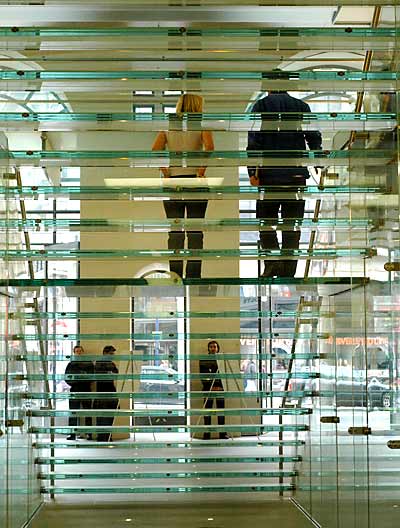My musings in the Observer about how the Net might affect the election are here.
Correction: AA points out that Howard Dean self-destructed in Iowa, not (as I had stated) Ohio. Doesn’t affect the argument, but I should have double-checked.

My musings in the Observer about how the Net might affect the election are here.
Correction: AA points out that Howard Dean self-destructed in Iowa, not (as I had stated) Ohio. Doesn’t affect the argument, but I should have double-checked.
BlogRunner.com first launched in late 2003 and then went offline last year. Now it’s back offering links to news stories and the Web logs that mention them, plus a new special section called “The New York Times Annotated”, which monitors blog postings referring to articles in the Times. Very interesting idea.
Thanks to Gerard for the link.
Royalweddingcam.com announces that it will be
launching this site Thursday 7th April 2005 in preparation for the wedding of Prince Charles and Camilla Parker-Bowles, who will be married in Windsor’s Guildhall on Saturday 9th April.
Our intention is to show live views of the Guildhall and some general webcam views of Windsor itself before, during and after this Royal Wedding.

Paul Graham is one of the best essayists about technology writing today. He’s just published an interesting essay on a phenomenon I’ve also noticed.
All the best hackers I know are gradually switching to Macs. My friend Robert said his whole research group at MIT recently bought themselves Powerbooks. These guys are not the graphic designers and grandmas who were buying Macs at Apple’s low point in the mid 1990s. They’re about as hardcore OS hackers as you can get.
The reason, of course, is OS X. Powerbooks are beautifully designed and run FreeBSD. What more do you need to know?
I’ve noticed this too. At the FOO camp in Holland last year, for example, the only laptops that weren’t PowerBooks were Sony Vaio machines running Linux. Paul Graham argues that this migration to the PowerBook and OS X is significant because geeks tend to have an influence on the evolution of computing out of all proportion to their numbers. What they run today, the business community may find itself running ten years on.
My Observer column on the case now before the US Supreme Court is out.
In a high-ceilinged courtroom in Washington last Monday, seven men and two women sat listening to arguments about technology. As far as we know, none of them is especially knowledgeable about technology.
Indeed, one of them disdains even to use a laptop, and writes his judicial opinions by hand on a yellow legal pad. But these are the highest judges in the US, and they are deciding the future of computing and possibly of the internet itself.
This may seem a grandiose claim, but bear with me…
Photographed in the Apple Store, London on April 1.

Ben Hammersley has a piece in today’s Guardian arguing that Yahoo is catching up with Google. Hmmm… Much as I like Ben, his reasoning — though provocative — seems a bit thin. “Google’s reputation comes from three things”, he writes, “the quality of its search results, the cutting-edge research and prototypes it produces, and the interfaces it provides for other programs to tap into, known as their application program interface (API).” Ben glosses over the first while praising Yahoo’s new research team and its now-released API. I’ll take his word on the API, but the research effort seems pretty flimsy. And the search results still aren’t anything like as good. We all agree that Google needs competition to keep it sharp, but I honestly don’t see Yahoo as providing it yet.
No one knows which way the Supreme Court will go, but the tech industry fears disaster: If the creators of programs that enable sharing over the Internet are liable for what people do with the software, then the manufacturers of any devices that enable copying could also be at risk. So everyone on the trail that leads from you to a given digital file is in danger — the computer manufacturer, the CD-burner manufacturer, the audio-editing software writer, the Internet service provider and the telecom company.
Andrew Leonard, writing in Salon about MGM v. Grokster, now before the US Supreme Court.
Lorcan Dempsey has a lovely one on his Blog.
The BUBL service was hosted at the University of Bath for a while. It gloried in the URL: www.bubl.bath.ac.uk.
According to the latest Pew Internet survey, about 36 million Americans — or 27% of internet users — say they download either music or video files and about half of them have found ways outside of traditional peer-to-peer networks or paid online services to gather and swap their files.
The Project’s national survey of 1,421 adult Internet users conducted between January 13 and February 9, 2005 shows that 19% of current music and video downloaders, about 7 million adults, say they have downloaded files from someone else’s iPod or MP3 player. About 28%, or 10 million people, say they get music and video files via email and instant messages. There is some overlap between these two groups; 9% of downloaders say they have used both of these sources.